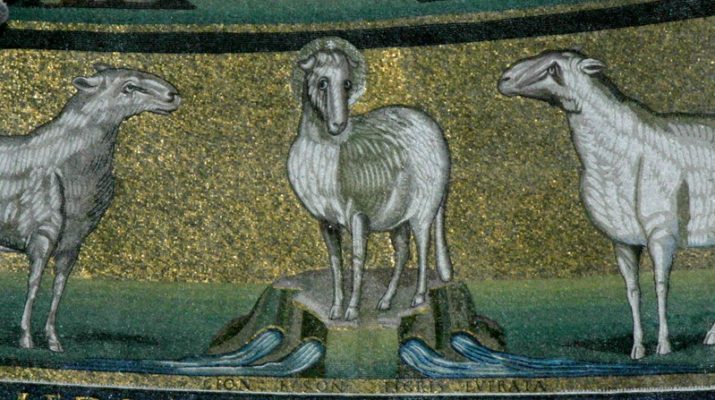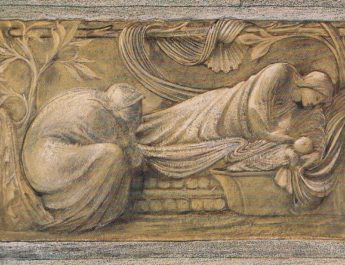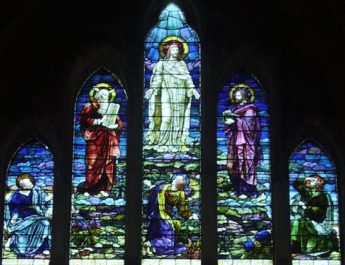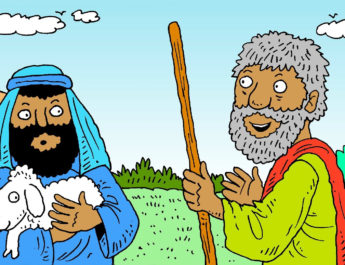John 1:29-42
Ordinary A8
29 The next dayA he sawB JesusC coming toward him and declared, “HereD is the LambE of GodF who takes awayG the sinH of the world!I
A “next day” = epaurion. 17x in NT. From epi (on, upon, at, what is fitting) + aurion (tomorrow, next day; properly fresh, which implies morning air) [from the same as aer (the air that we breathe, breathing, blowing); from aemi (to breathe, blow)]. This is tomorrow, the next day.
B “saw” = blepo. To look at, see, perceive, be observant. This is usually seeing in a strictly physical sense. It can also mean behold or beware.
C “Jesus” = iesous. From Hebrew Yehoshua (Joshua, the Lord is salvation); from YHVH (proper name of the God of Israel; the self-existent and eternal one); from havah (to become) or from hayah (to come to pass, become, be) + yasha (to deliver, defend, help, preserve, rescue; properly, to be open, wide or free, which implies being safe. So, in a causative sense, this is to free someone. This is Jesus or Joshua in Greek – the Lord saves or the Lord is salvation.
D “here” = idou. From eido (to be aware, see, know, remember, appreciate). This is see! Lo! Behold! Look! Used to express surprise and or draw attention to the statement.
E “Lamb” = amnos. 4x in NT. This is lamb, particularly used to reference a one-year old lamb without defect. It implies innocence and sacrifice. This may be related to the English word “amniotic.”
F “God” = theos. From Proto-Indo-European origins, meaning do, put, place. This is God or a god in general.
G “takes away” = airo. This is to raise, lift, carry, or take away. Can be used to mean raise your voice, keep in suspense, sail away. It can also mean to forgive sin by use of a Hebrew turn of phrase.
H “sin” = hamartia. From hamartano (to miss the mark, do wrong, make a mistake, sin). Hamartano is from a (not) + meros (a part or share). Literally, this means not having one’s share or portion – like not receiving inheritance or what was allotted to you. This word means missing the mark so it is used for guilt, fault, and acts of sin.
I “world” = kosmos. This is the world or the inhabitants of the world, worldly affairs, the universe. Literally, it is something that is ordered. Hence, a system that is ordered like the universe. It can also refer to adornment as that which beautifies and, therefore, brings into order. This is where “cosmos” and “cosmetics” come from.
30 This is he of whom I said, ‘After me comes a manJ who ranks ahead of me because he was beforeK me.’ 31 I myself did not knowL him; but I came baptizingM with waterN for this reason, that he might be revealedO to Israel.”P
J “man” = aner. This is male, fellow, husband, or sir.
K “before” = protos. From pro (before, forward, first, in front of, earlier than). This is first, chief, before, most important. It could be that which comes first or that which is number one.
L “know” = eido. Related to “here” in v29. See note D above. This is to see physically, but also to perceive figuratively – to see so as to know, which implies awareness.
M “baptizing” = baptizo. To dip, dye – covering something entirely with liquid. This is to submerge, baptize or wash.
N “water” = hudor. Perhaps from the base of huetos (rain); from huo (to rain). This is water in a literal or figurative sense – water as rainy.
O “revealed” = phaneroo. From phaneros (clear, apparent, visible, manifest, shining); from phos (light, a source of light, fire, or radiance. This is light with specific reference to what it reveals. It is luminousness whether natural or artificial, abstract or concrete, literal or figurative); from phaos (light, daylight); from phao (to shine or make manifest – generally through rays). Properly, this is to illumine and figuratively it is to make plain, make manifest, or make clear.
P “Israel” = Israel. From Hebrew Yisrael (God strives or one who strives with God; new name for Jacob and for his offspring); [from sarah (to persist, exert oneself, contend, persevere, wrestle, prevail) + el (God or god)]. This is Israel the people and the land.
32 And JohnQ testified,R “I sawS the SpiritT descending from heavenU like a dove,V and it remainedW on him. 33 I myself did not know him, but the one who sentX me to baptize with water said to me, ‘He on whom you seeY the Spirit descend and remain is the one who baptizes with the HolyZ Spirit.’ 34 And I myself have seen and have testified that this is the Son of God.”
Q “John” = ioannes. From Hebrew yochanan (Johanan); from Yehochanan (“the Lord has been gracious”); [from YHVH (proper name of the God of Israel); from havah (to become); from hayah (to be, exist, happen) + chanan (beseech, show favor, be gracious; properly, to bend in kindness to someone with less status). This is John.
R “testified” = martureo. From martus (a witness whether having heard or seen something; witness literally, judicially, or figuratively; by analogy, a martyr). This is to bear witness, testify, give evidence; to testify in a literal or figurative sense.
S “saw” = theaomai. From thaomai (to gaze at a spectacle; to look at or contemplate as a spectator; to interpret something in efforts to grasp its significance). This is to behold, look upon, see, contemplate, visit. This is gazing or considering something as a spectator so as to understand its significance. This is where the word “theatre” comes from.
T “Spirit” = pneuma. From pneo (to blow, breath, breathe hard). This is wind, breath, or ghost. A breeze or a blast or air, a breath. Figuratively used for a spirit, the human soul or part of us that is rational. It is also used supernaturally for angels, demons, God, and the Holy Spirit. This is where pneumonia comes from.
U “heaven” = ouranos. May be related to oros (mountain, hill) with the notion of height. This is the air, the sky, the atmosphere, and heaven. It is the sky that is visible and the spiritual heaven where God dwells. Heaven implies happiness, power, and eternity.
V “dove” = peristera. 10x in NT – 5x of doves as sacrificial animals, 4x of Jesus’ baptism, 1x be wise as serpents and innocent as doves. This could be dove or pigeon.
W “remained” = meno. This is to stay, abide, wait, await, or remain. It can mean to stay in a certain place, state, relation, status of expectancy, etc. It can mean to continue, dwell, or endure.
X “sent” = pempo. To send, permit to go, transmit. This is to send someone out with a focus on the point of dispatch. Another word, hiemi, emphasizes the destination and stello emphasizes the movement. This is dispatching someone, particularly for a temporary errand.
Y “see” = horao. To see, perceive, attend to, look upon, experience. Properly, to stare at and so implying clear discernment. This, by extension, would indicate attending to what was seen and learned. This is to see, often with a metaphorical sense. Can include inward spiritual seeing.
Z “Holy” = hagios. From hagnos (holy, sacred, pure ethically, ritually, or ceremonially; prepared for worship, chaste, unadulterated, pure to the core; undefiled by sin; figurative for innocent, modest, perfect). God is totally different from humanity and thus set apart. That which is consecrated to worship God (elements of worship) or to serve God (as the saints) are holy because they are now set apart for God’s purposes. Holy because important to God. This is sacred physically, pure. It can be morally blameless or ceremonially consecrated.
35 The next day John again was standing with two of his disciples,AA 36 and as he watchedBB Jesus walk by,CC he exclaimed, “Look,DD here is the Lamb of God!” 37 The two disciples heard him say this, and they followedEE Jesus. 38 When Jesus turned and sawFF them following, he said to them, “What are you looking for?”GG
AA “disciples” = mathetes. From matheteuo (to make a disciple of); from mathnao (to learn key facts, gain knowledge from experience; generally implies reflection as part of the learning process); from math– (thinking things through). This is a disciple, learner, or student. It is where we get “mathematics” from.
BB “watched” = emblepo. Related to “saw” in v29. 12x in NT. From en (in, on, at, by, with) + blepo (see note B above). This is to look at, behold, or gaze at. It is staring at something with focus and special interest – observing so as to see clearly or consider.
CC “walk by” = peripateo. From peri (about, concerning, around, encompassing) + pateo (to read, trample on; to trample literally or figuratively) [from patos (trodden) OR from paio (to strike, smite, sting; a hit like a single blow)]. This is to walk. Going from Hebrew figurative languish, to walk referred to how you conducted your life, how you chose to live. This word is most literally walking around. Figuratively, it is living, behaving, following, how you occupy yourself. This is where “peripatetic” comes from.
DD “look” = idou. Same as “here” in v29.
EE “followed” = akoloutheo. From a (with, union) + keleuthos (road, way). This is to follow, accompany, or attend. It is often used to describe the way that disciples follow.
FF “saw” = theaomai. Same as “saw” in v32.
GG “looking for” = zeteo. This is to investigate or search – it includes asking around to get to the bottom of things. It can be seek in a literal or figurative sense. According to a Hebrew idiom, it can mean to worship God.
They said to him, “Rabbi”HH (which translatedII means Teacher),JJ “where are you staying?”KK
39 He said to them, “Come and see.” They came and saw where he was staying, and they remained with him that day. It was about four o’clock in the afternoon.LL
HH “Rabbi” = rhabbi. 15x in NT. From Hebrew rab (chief); from rabab (to be many or become many, increase, multiply, to cast together). This is my master, my teacher, or Rabbi. It is a title of respect for a religious teacher-scholar with a public presence – teaching the people. It could be translated great one or honorable sir.
II “translated” = methermeneuo. 8x in NT. From meta (with, among, behind, beyond) + hermenuo (to interpret, translate, explain) [perhaps from Hermes (the Greek god who was a messenger to the gods, but also the god of language)]. This is to translate or interpret. Literally, it is to explain over from one to another and so to translate.
JJ “Teacher” = didaskolos. From didasko (to teach, instruct; literally to cause learning); from dao (learn). This is teacher, master, or instructor.
KK “staying” = meno. Same as “remained” in v32.
LL “it was about four o’clock in the afternoon” = Literally “the hour was about the tenth.”
40 One of the two who heard John speak and followed him was Andrew,MM SimonNN Peter’sOO brother.PP 41 He firstQQ foundRR hisSS brother Simon and said to him, “We have found the Messiah”TT (which is translated Anointed).UU 42 He brought Simon to Jesus, who lookedVV at him and said, “You are Simon son of John. You are to be called Cephas”WW (which is translatedXX Peter).
MM “Andrew” = andreas. 13x in NT. From aner (see note J above). This is Andrew, an apostle. His name means manly.
NN “Simon” = simon. From Hebrew Shimon (Simeon, son of Jacob, his tribe, and others); from shama (to hear, call, consent, or consider. It implies listening intelligently, giving attention, and, because of these two factors, obedience and action are often implied). This is Simon – the one who hears.
OO “Peter’s” = petros. Related to petra (a large mass of connected rock as a ledge, cliff, cave, or stony ground). This is Peter, stone, pebble, boulder. It is rock that is detached. This name seems to be original to the New Testament.
PP “brother” = adelphos. From a (with; denotes fellowship) + delphus (womb). This is brother literal or figurative. Properly, this is one who shares a womb with you. Can also be used for a fellow Christian.
QQ “first” = protos. Related to “before” in v30. From protos (see note K above). This is before, at the beginning, first, formerly, or in first place. It could be first in time, first in rank, first in order, or first in importance.
RR “found” = heurisko. This is to find, learn, or get. It often has the sense of discovery – finding something after a search. This is where the English word “heuristics” comes from.
SS “his” = idios. Literally “his own” rather than simply “his.” Idios means person, private, distinct, uniquely one’s own. It is more emphatic than the regular possessive pronoun autos.
TT “Messiah” = Messias. 2x in NT. From Hebrew mashiach (anointed, anointed one, messiah; someone consecrated like a king, priest, or holy person); from mashach (to smear, anoint, paint, rub with oil; this implies consecrating). This is Messiah or Anointed One.
UU “Anointed” = christos. From chrio (consecrate by anointing with oil; often done for prophets, priests, or kings). Literally, the anointed one, Christ. The Greek word for Messiah.
VV “looked” = emblepo. Same as “watched” in v36.
WW “Cephas” = kephas. 9x in NT. From Aramaic kepha (stone, rock). This is rock or Cephas, a name for the apostle Peter.
XX “translated” = hermeneuo. Related to “translated” in v38. See note II above.
Image Credit: “Lamb of God” from the Basilica of Cosmas and Damien, 527.




